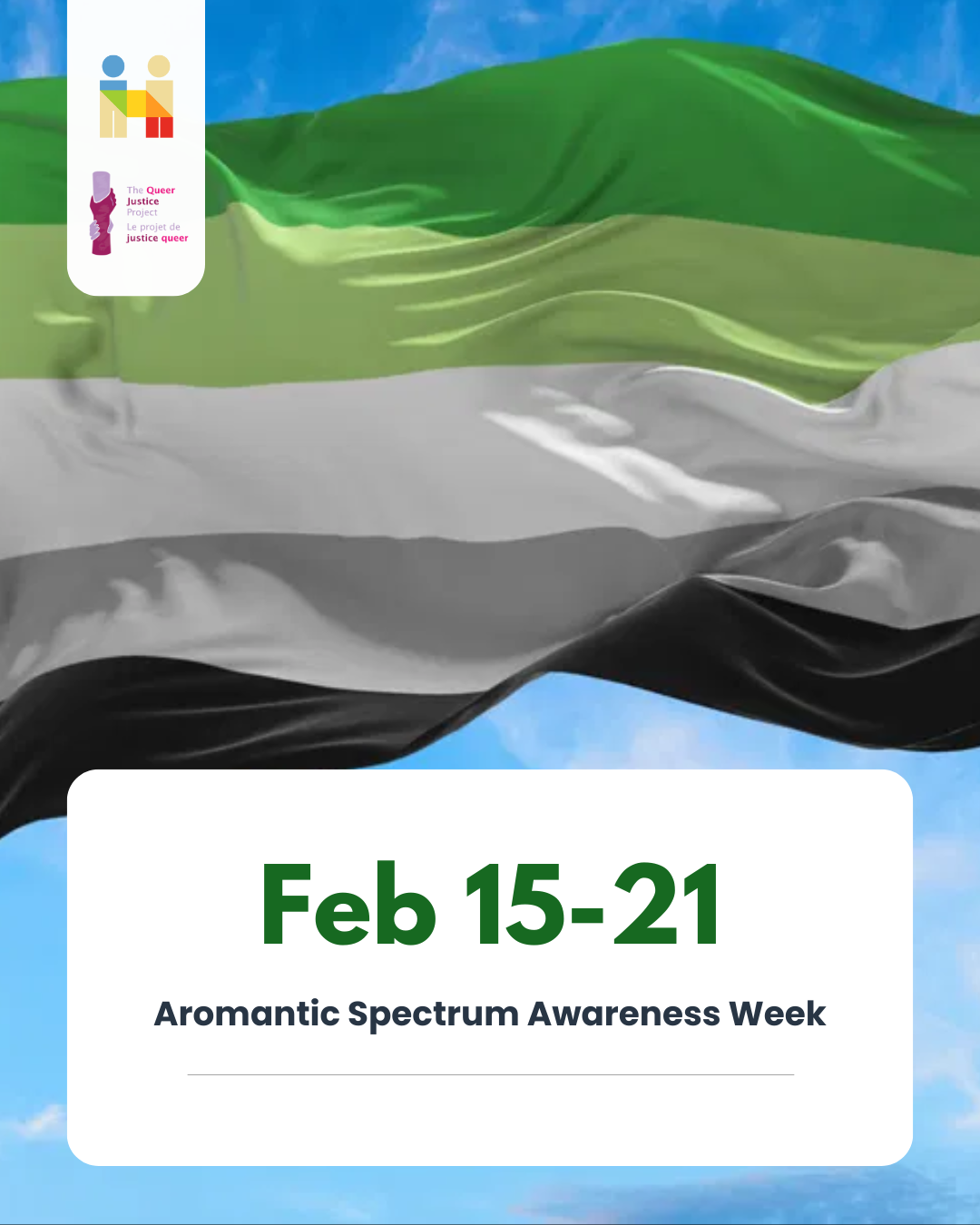
Aromantic Spectrum Awareness Week is an annual, week-long event held to raise awareness and educate people about the identities and issues aromantic people face.
Aromantasism is an identity that sits under the “ace” umbrella. The prefix “ace” is defined as the absence of attraction. It is the opposite of “allo”, meaning “to have attraction”.
There are many different forms of attraction, some include: platonic, romantic, sexual, sensual, estetic, alterous, and more! Ace people may have some, or total absence of attraction in one or more of the attraction categories.
Under the romance category of this split attraction model people may identify as aromantic, alloromantic or somewhere in between.
In other words, “Aromanticism is a romantic orientation, which describes people whose experience of romance is disconnected from normative societal expectations, often due to experiencing little to no romantic attraction, or sometimes feeling repulsed by romance or being uninterested in romantic relationships.”
The aromantic flag consists of five equal horizontal stripes. From top to bottom they are: Dark green and light green representing the aromantic spectrum, white representing platonic love and friendships, and lastly grey and black representing the sexuality spectrum.
Green was chosen as the primary colour due to it being the opposite or red, which is often associated with romance.
“Amatanormativity: Amatonormativity is the assumption that a central, exclusive, romantic relationship is normal for humans, and is a universally shared goal.”
Due to misinformation and stereotyping, many aromantics have felt the repercussions of both invisibility and bigotry in and outside the queer community due to amatanormativity.
As a result, there are many social and legal hurdles aro people face globally.
Amanormativity in law negatively affects rights including, but not limited to:
Sources:

This week, the Hamilton Police Services (HPS) released community alerts about a hate motivated assault against a transgender community member. This incident occurred in the early morning of Saturday, October 25 at approximately 2:30 a.m., in Hess Village. Although two arrests were made, police are still actively seeking information about additional individuals involved. We encourage anyone with information that could assist the police investigation to contact Detective Lyndsay Scott at LScott@hamiltonpolice.ca or 905-546-5678. Information can also be provided anonymously to Crime Stoppers at 1-800-222-8477. Include images/screen shots from: https://hamiltonpolice.on.ca/news/update-arrests-made-in-hate-motivated-assault/ Unfortunately, this is not the only recent hate motivated attack against a member of Hamilton’s Two-Spirit, trans, nonbinary, and gender diverse community that we are aware of.
Attacks against our local trans siblings are increasing in number and severity. This rise in hate is directly tied to the dehumanizing politicization of trans lives. In the United States, the Trump administration is implementing policies designed to erase trans people from public life. In our own country, the provincial governments of Saskatchewan and Alberta have invoked the Charter’s notwithstanding clause to strip trans people of their fundamental rights protections. And in Hamilton, we’ve witnessed billboards calling for an end to gender-affirming care for trans youth and academic research designed to undermine access to gender affirming care. This growing climate of hate is having a real-life impact on the safety of our city for our trans siblings.
We stand in solidarity with our trans siblings, and we call on our allies and community leaders to stand up publicly for trans right and trans safety. We will continue to actively work with our local trans community members, partners, and allies to make Hamilton safe for all.
We encourage anyone who has experienced or been impacted by an incident of
transphobic hate in Hamilton to reach out to us for support and community resources.

This past weekend another digital billboard appeared in Hamilton calling for an end to gender-affirming care for trans youth. This is after a similar billboard was removed on the Mayor’s direction in August.
We are disturbed that these billboards continue to spread disinformation in Hamilton. The Canadian Medical Association, Canadian Pediatric Society, Children’s hospitals in Ontario, and the Greater Hamilton Health Network all stand together against care bans and in favor of gender-affirming care.
We are worried about the impact that this type of harmful messaging, displayed in our city, has on our local trans and gender diverse community members, especially youth. We know that attacking gender-affirming care for children is often a gateway to undermining the very existence of trans identities and lives. We believe in a Hamilton where trans and gender diverse individuals are accepted, supported, and celebrated.
What can you do?

Transgender Awareness Week is an annual reminder to take action. We must advocate for our collective rights, educate the public about transgender people as well as the issues they face, and uplift the positive and insightful stories of trans people.
Transgender is an umbrella term encompassing a wide variety of different experiences and identities. People whose identity is different from the gender imposed upon them at birth may identify as transgender or trans.
Colonial language places people into boxes that may not fit who they truly are from a simple glance. Even the biological status most people indicate as being the binary male or female is incredibly complex and discards the wide spectrum of humans including those who are intersex. With different variables such as chromosomes, hormone prevalence, internal and external anatomy, and more – sex and its variance far exceed what people may initially have been taught to think.
Gender is just as open-ended. Under colonial rule it has been defined as the social roles and behaviors within the gender binary of man and woman. However, this definition centers the views, expectations, and assumptions of others.
While an individual’s experience of gender can include social roles and behaviors, it also includes cultural, and mental state of being. In terms of labels, this can mean identifying as female, male, both, neither, somewhere in between, and more. Instead of viewing gender from a strict binary set of rules set by others, gender in actuality, is how someone feels about themselves and how they experience the world.
Canada has seen an increase in transphobic ideology and attacks.
Anti-trans sentiments are not new to the country, despite the federal government moving to protect the rights of transgender people in 2017 with the passing of Bill C-16, making gender identity and expression a protected human right.
Over the past year we have seen political leaders falsely arguing that school boards were “indoctrinating” students about gender issues, Saskatchewan introducing a new law requiring parental permission for students to informally change their name and pronouns at school, Alberta’s proposal of Anti-Trans legislation, and more.
More recently and locally, a mural showcased outside at The Artist Inc in Hamilton was defaced in an intentional transphobic hate crime earlier this fall. The colourful mural by Ris Wong read “ Trans lives are sacred, Trans joy is sacred”. It was graffitied over with transphobic memes, then transphobic comments written in sharpie, and eventually the billboard was ripped all the way across. What was meant to be a sign of hope and love for many, became an example of the harmful, regressive anti-queer ideology locally and globally.
It is up to our so-called leaders to protect and instate the rights of our transgender community members. They must remember that creating a safe and inclusive Canada, Ontario, and Hamilton means stopping this hate at its source instead of perpetuating it further.
While policy makers, governments, world leaders and more must do their part, it is also important for allies to be a part of positive change, keep the trans community safe, and foster a sense of belonging. This means:
“Growing up in Hamilton, I have unfortunately seen my fair share of queer, gender, and race related hate crimes, harassment, and more. Before I came out, I feared what would happen to me if I was a visible trans person, and how that would affect my life in the city – as there weren’t as many accessible or safe spaces for me all those years ago. But as my dysphoria got worse and worse as I tried to bottle up all of my feelings, I could no longer wait for the world to be kinder. I made the brave decision to be scared and be my authentic self anyway.
I’m glad I did, because it saved my life. Even with everything going on, I wouldn’t want to be anything other than myself. I live authentically advocating for my community, especially for those who may not have the privileges I do, working towards a future where they don’t have to worry about what I did. I do it for the black queer and trans femmes, the trans people whose lives have been lost due to hate crimes, and I do it for the cis people who get misgendered and then assaulted because of transphobia – because it affects all of us. Local organizations like the Hamilton Trans Health Coalition, the Hamilton Community Legal Clinic, and more give me a spark of hope, but there is still a lot of work to be done to ensure the safety of the transgender community. I hope that one day Hamilton becomes a place of belonging, but until then – as we sit at the 3rd highest rated for hate crimes in Canada, I will continue to put in the work and ask others to do the same.
Trans lives matter.
Gender-affirming care saves lives.”
-Anonymous
The HCLC invites you to sit and think about your own internal and external biases surrounding gender and sex. How can you be a part of change, while making sure not to center yourself?
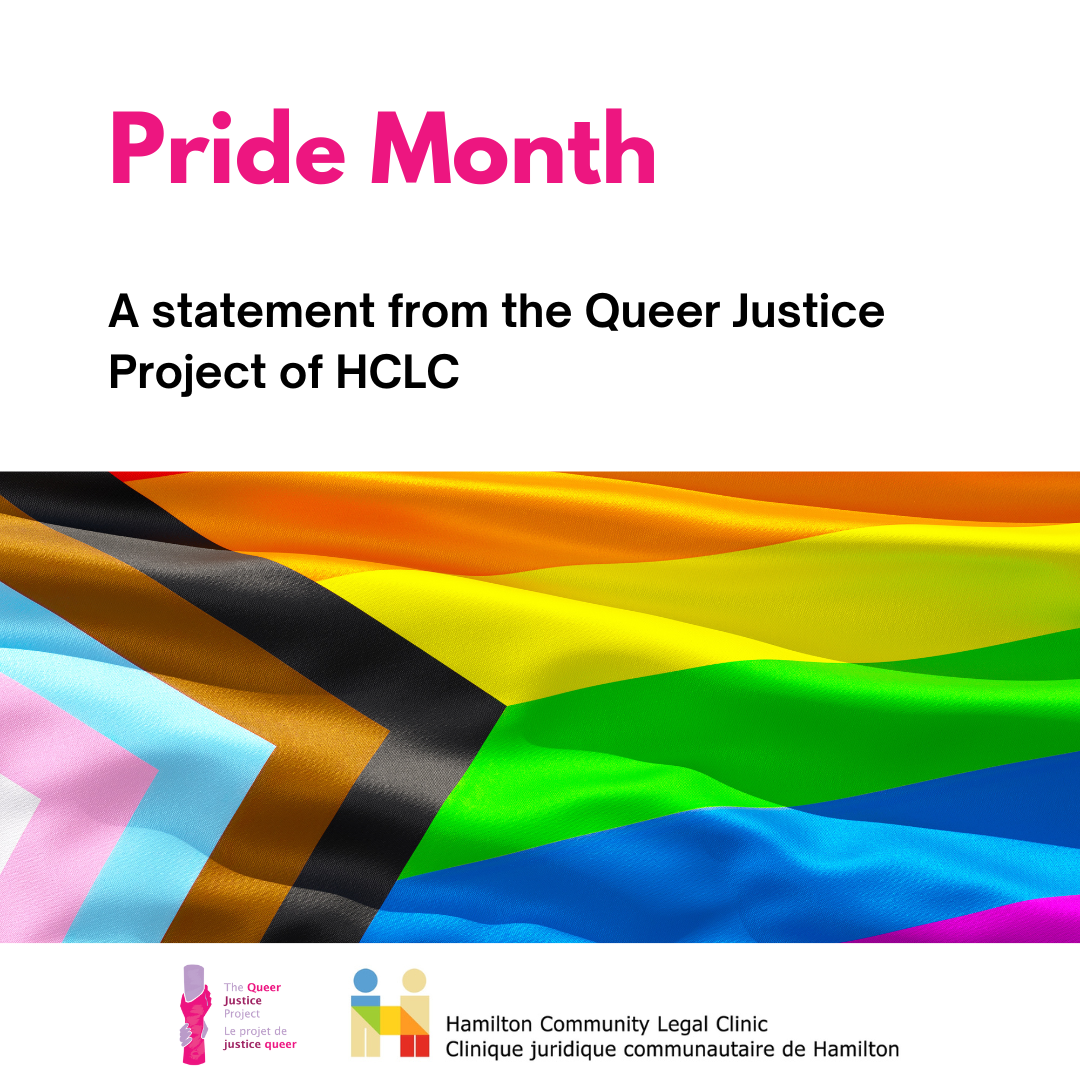
The Hamilton Community Legal Clinic (HCLC)’s Queer Justice Project (QJP) wish a happy Pride to all Two-Spirit + LGBTQIAPGNC community members in Hamilton and around the world!
Each year, Pride is a time for celebration and reflection, but fundamentally, it is always important to remember that it started as a riot, a protest, and a movement. Increasingly, the origins of Pride seem more relevant to our present than perhaps they were for a period. We had seen steady progress made in terms of both legal reforms and social acceptance for most Queer identities.
However, this past year in particular, we have witnessed words and actions by Canadian governments and major political parties that signal that the progress we have enjoyed is now under immediate threat. Our communities have witnessed and been the target of new policies and laws that violate our human rights and jeopardize our safety, and there is reason to expect more may come in the future.
Sadly, this year, a recent Global News article published on May 25, 2024, titled “CSIS Warns Some LGBTQ2 Events, Venues May Face Threats from ‘Lone Actors’,” highlights an alarming trend. The article recounts a harrowing incident at the University of Waterloo, where a hate-motivated attack during a gender studies class injured two students and a professor. This brutal act was a premeditated assault driven by hatred towards gender expression and gender identity.
The Two-Spirit and LGBTQIAPGNC communities are uniting with renewed determination and resilience. In response to escalating threats and hostility, communities are taking decisive and thoughtful actions on multiple fronts. Communities are countering the spread of harmful false narratives, launching legal challenges against discriminatory government actions, and bolstering security measures to safeguard Queer events. Additionally, they are organizing protests and counter-protests, standing firm against the rising tide of human rights violations, hate and hostility. Just as they (we) have always done, we are confronting adversity with solidarity and unwavering courage.
Through it all, the spirit and joy of Queer communities will always shine through. Hate will not be allowed to define us, and nor does the seemingly constant need to struggle for our own liberation. Pride is a reminder of the where we have been, those we have lost, what there is still to do. We have the right to live our lives in joy and love, including in this moment.
This year, we also want to acknowledge all other struggles for liberation across the world. Queerness spans all of human experience, and intersects with every other possible identity at some point. As a result, every struggle for liberation and equality is a Queer struggle as well. Our communities overwhelmingly recognize that, and it is why our communities often demonstrate truly beautiful acts of solidarity across movements. Queerness rights are human rights.
We are powerful, and so let this year’s Pride serve as a rallying cry as well. In our own struggles for peace and equality, and in solidarity with Two-Spirit + LGBTQIAPGNC around the world who face considerable threats, torture and criminalization. We will be free, we will be equal, we will be safe, and we will be Proud.
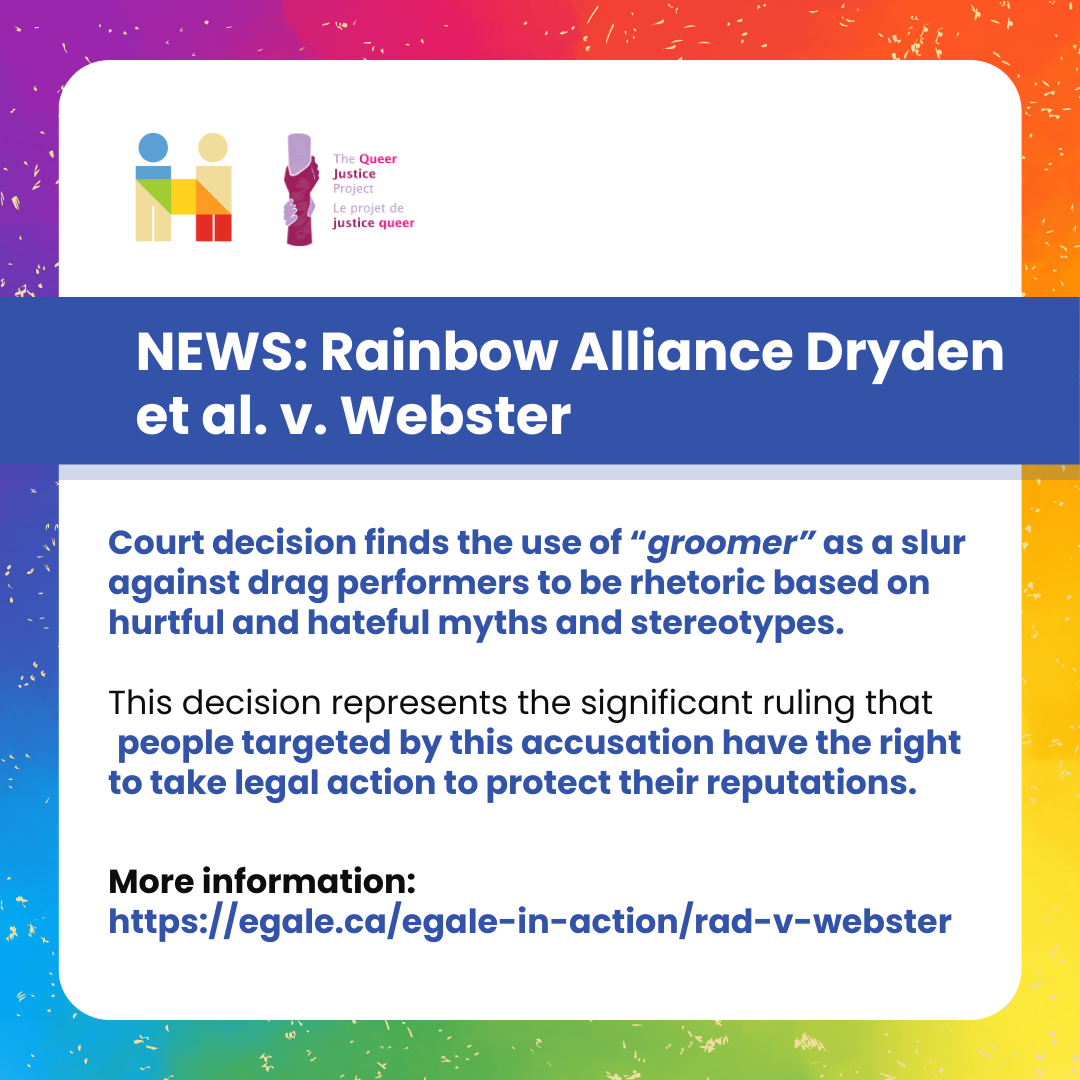
On December 14, 2023, the Ontario Superior Court of Justice decided in Rainbow Alliance Dryden et al. v. Webster to allow a defamation suit by a drag performer and a 2SLGBTQI community organization against an individual who publicly called them “groomers” to continue to trial.
In doing so, the court initially ruled that there is no public interest in protecting baseless accusations of child sexual abuse against 2SLGBTQI people.
The court then relied on Egale Canada’s intervention to affirm the exact opposite: Because false accusations of pedophilia have been weaponized against 2SLGBTQI people to deny members of our communities equal rights and opportunities for decades, the law must allow people being targeted by these homophobic and transphobic myths to pursue defamation claims.
In recent years, drag performers putting on family-friendly shows have been increasingly targeted with the baseless accusation that they are grooming children for sexual abuse. The correct use of the word “grooming” refers to practices by which sexual abusers gain access to victims, usually children and youth, and coerce and manipulate them to facilitate sexual abuse.
Drag performances are a form of cultural expression and the equation of drag performances to child grooming is based on the homophobic and transphobic belief that gender diversity is inherently dangerous to children. The court accepted that the term “groomer” has come to function as a slur against drag performers and 2SLGBTQI people more broadly.
The court’s decision finds the use of the “groomer” slur against drag performers to be rhetoric based on hurtful and hateful myths and stereotypes
This is an important decision for 2SLGBTQI communities that comes at a time when we are facing unprecedented levels of hate, harassment, and violence fuelled by the spread of misinformation and disinformation. As noted in the court’s decision, the term “groomer” is a slur used against drag performers that is “rhetoric based on hurtful, and hateful myths and stereotypes…”
This decision represents the significant finding that calling drag performers “groomers” is an accusation of child sexual abuse and that people targeted by that accusation have the right to take legal action to protect their reputations.
Credits and Source: Egale Canada
https://egale.ca/egale-in-action/rad-v-webster
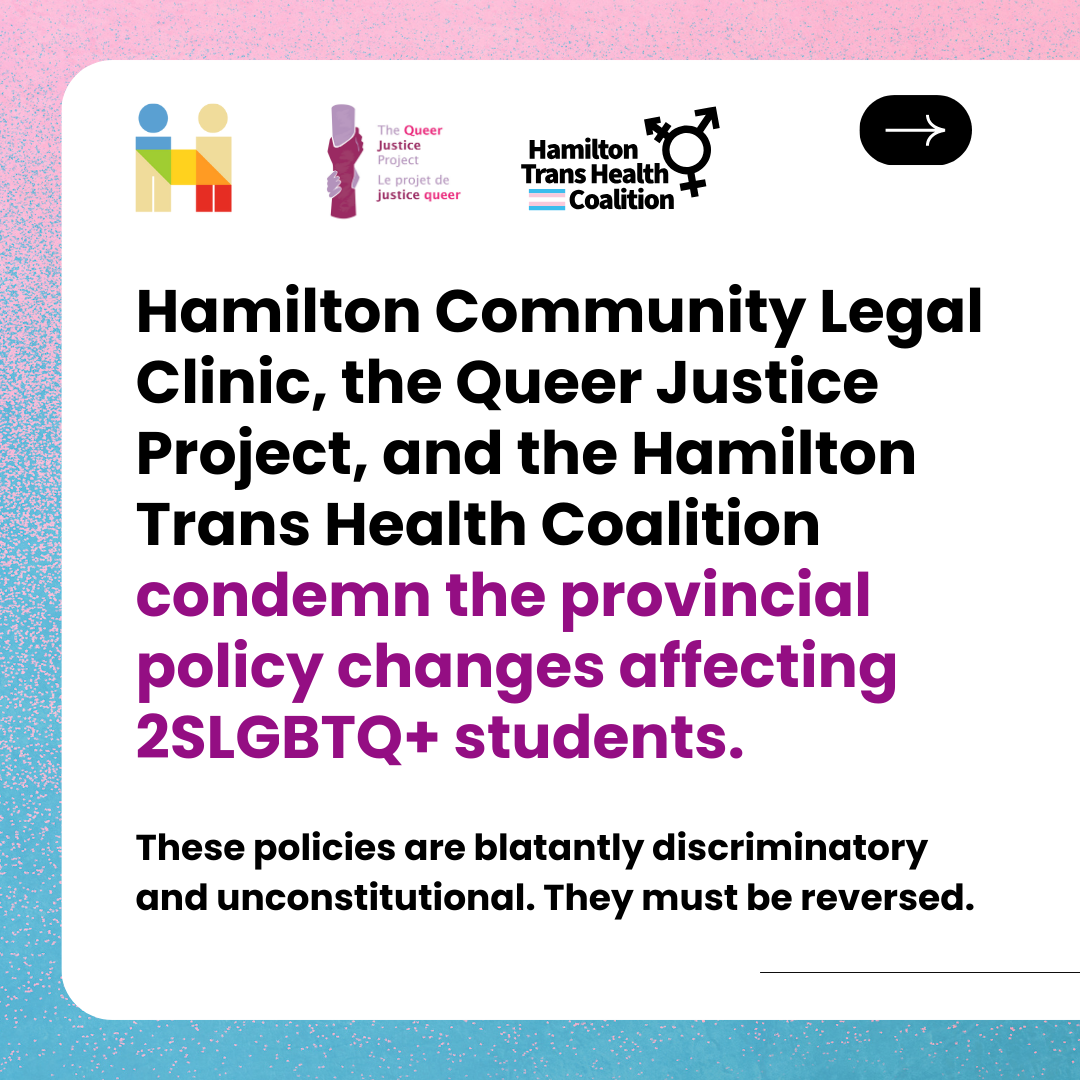
The Queer Justice Project (QJP), the Hamilton Community Legal Clinic (HCLC), and the Hamilton Trans Health Coalition (HTHC) condemn the recent actions of the Premiers of New Brunswick, Manitoba, and Saskatchewan with regards to promised or implemented discriminatory and unconstitutional changes to school policies relating to name changes and pronoun usage. We also note the recent concerning comments made by Ontario’s Education Minister Stephen Lecce, stating that “parents must be fully involved” when youth elect to use a different pronoun at school. We call on each government to reverse these policy decisions and to commit themselves to respecting the human rights of all students, and to creating inclusive, supportive, and healthy school environments for all youth. We caution other provinces against taking similar actions.
Specifically, New Brunswick has implemented changes to Policy 713 that will now require that youth under the age of 16 seek parental consent to change the names and pronouns used while at school, and removes the guarantee that children will be able to participate in sports and extracurricular activities which are consistent with their gender identity. Saskatchewan is also requiring youth under 16 to obtain parental consent to change the names and pronouns used at school, and has also undermined the provision of sexual health education by enabling parents to decline their child’s participation and by prohibiting third-party educators. Manitoba’s current Premier has made election promises relating to expanding “parental rights”, though the exact nature and wording of these changes are unclear. The Premier did indicate that at minimum parental rights to be informed of their child’s request to change the name and pronouns used at school would be part of the consultations on these changes. Ontario’s intentions on this matter are not clear as of yet, though the comments of the Education Minister certainly suggest an intention to make similar discriminatory changes to their policies.
These policies will undoubtedly cause severe and irreparable harm to many Trans and gender diverse students. The unfortunate reality is that many young Queer community members cannot rely on positive reactions or supportive responses to their Queer identities, should they be revealed to their families. The emotional, social, psychological, and potentially physical negative consequences of being forcibly “outed” are well known to experts and Queer communities. Forcibly outing a Queer individual is an act of violence. Homophobia, and particularly transphobia, remain significant issues within our society, as these policies demonstrate.
These governments do not deserve the benefit of the doubt or the presumption of good intentions in the introduction of these policies. There was no problem that these policies are meant to solve, no legitimate purpose they could possibly serve other than to interfere with the very personal decisions of Queer youth of when, or if, to reveal their identities to their families. They have failed to define any specific right of parents that is being violated or harm being suffered by parents due to schools respecting the requested names and pronouns of their students.
These policy decisions cannot be removed from the context of a growing movement of hate and conspiracy towards Queer identities generally, and Trans identities specifically. This includes a significant lack of understanding, and the purposeful spreading of disinformation by some, relating to gender affirming health care, particularly for youth.
These policies, notably all emanating from conservative provincial governments, with tacit support from the current federal Conservative party leader, are a continuation and escalation of the rise Transphobia and general anti-Queer sentiments being witnessed in our society. It also mirrors some of the transphobic legislative and policy decisions being made in parts of the United States. These policies are blatantly discriminatory and unconstitutional. They must be reversed.
Each province has sought to justify these decisions and comments by citing “parental rights”. However, it is clear that these policy changes, whether intentionally or not, will have a significant negative and discriminatory impact on Queer students. Policy changes relating to name and pronoun usage by students at school are inherently related to the gender identities of students, which is a prohibited ground of discrimination under provincial human rights laws, federal human rights law and the Charter of Rights and Freedoms, and internationally recognized human rights and rights of children.
Children under the age of 18 are rights holders in their own right, including rights to be free from discrimination based on their personal characteristics, freedoms of expression and of conscience, and a right to privacy. Equally, Canadian family law, including in each of these provinces, provides that the overriding interest will always be the “best interests of the child”, with the primary considerations being the physical, emotional, and psychological safety and security of the child. Children are also given rights to participate in the decisions made about them and their care, in accordance with their age and capacity, giving them the right to an evolving degree of autonomy. In many jurisdictions, where youth have shown a level of independence and self-sufficiency before attaining the age of 18, they can be deemed to have removed themselves from parental authority.
In contrast, the term “parental rights” is becoming a commonly used right-wing extremist political catchphrase primarily seen in relation to advocating for greater restrictions on a school system’s ability to address topics relating to diversity initiatives and sexual education, specifically in relation to sexual orientation and gender identity. The sudden fervour in support of parental rights does not include any apparent interest in any topics or educational goals other than sexual health, sexual orientation, gender identity, or other diversity initiatives. It is a hate movement fuelled by a moral panic.
The term “parental rights” is rarely explicitly seen in Canadian law, though there are rights related to the integrity of and non-interference with the family unit that are owed to all its members. Parental participation rights within existing school systems, as outlined in the education legislation of various provinces, also exist. Many provincial laws instead utilize definitions for terms like “decision-making responsibility”, “parenting time”, and “parental responsibilities”, which relate to the concepts of custody and access. These terms demonstrate a recognition that the fundamental nature of the relationship of a parent to their child is one of responsibility, not of rights. These responsibilities relate to the obligation to provide support and guidance to a child, whose right it is to receive these from their parents. Parents do not own their children. As a result, parental rights are not absolute and can be terminated where there is a compelling reason, including where it is determined to be in the best interests of the child.
No one denies that ideally parents would be able to be informed and involved in all important aspects of their child’s life, and that all children should be confident that being fully open with their parents would result in nothing but love and support. But that is not reality. Pretending it is erases the vast majority of Canadian and global history, including the situation in the majority of the world today, where Queer identities are the frequent targets of discrimination, criminalization, ostracization, and violence. This includes the perpetuation of these acts by immediate family members.
Beyond the ahistorical nature of these policies, it is quite clear that these policy decisions are being made without proper consultations with youth who may be affected, Queer communities, or experts on children’s health and well-being. The government of New Brunswick was unable to produce any evidence of the complaints they alleged initiated the review of Policy 713, and once initiated, many stakeholders in New Brunswick expressed concern about their exclusion from any consultation process. The government of Saskatchewan has avoided answering the question of what experts were consulted in making these changes, and instead has reiterated the importance it places on the perspective of parents and has pointed to apparent popular support for the policy in opinion polls.
To be clear, the purpose of human rights legislation and the Charter is to protect vulnerable minorities from the potentially discriminatory attitudes and actions of the majority. Popular support for a discriminatory policy does not save it under Canadian law, and in fact reinforces the need for protection of that group.
In mid-August, the New Brunswick Child and Youth Advocate, Kelly Lamrock, issued a report that included a comprehensive overview of the history of Policy 713, its purpose, the review process, and the legal framework around parents’ rights and the rights of children. After a legal analysis, including the consideration of the perspectives of parents, students, and experts, the report concluded that the changes to Policy 713 violate the Charter rights of Trans and gender-diverse youth to be free from discrimination, to privacy, and to have their needs accommodated. We would highly encourage everyone to read this report in full.
The recent announcement of the policy changes in Saskatchewan have met similar conclusions of human rights violations from the Canadian Civil Liberties Association, which plans to support a legal challenge that has now been filed by national Queer organization Egale and the University of Regina’s UR Pride. The Saskatchewan Advocate for Children and Youth, who was not consulted prior to the announcement of the policy changes, has also indicated her plans to review the new policy while expressing concern over its contents.
Any changes to the accessibility of washrooms that conform to a student’s gender identity would also be a violation of the human rights of students. While the New Brunswick policy changes do not appear to impede this right, it ought to be recognized that the right to the use of washroom facilities in accordance with a person’s gender identity is settled law in Canada. Similarly, the right for all to play in sports and engage in recreational activities generally in accordance with a person’s gender identity ought to be respected. The change in language in Policy 713 does remove the explicit recognition of this, which is unfortunate and should be restored. Trans and gender-diverse students deserve to have their rights explicitly acknowledged and reinforced.
The undermining of sexual health education in Saskatchewan, while not amounting to discrimination, will certainly undermine the health and safety of students and society at large. Comprehensive and fully resourced sexual education is a public good that helps educate youth in an effort to prevent abuse, unwanted pregnancies, and health issues like STIs. Comprehensive sexual education also includes resources and education that acknowledge the diversity of human sexuality and relationships. Third party resources previously used in Saskatchewan that address topics related to diversity were cited as examples by the government of Saskatchewan of what would no longer be permitted. Health experts in Saskatchewan have expressed their concern about the negative impacts these changes will have. Saskatchewan cited parental interests once again as the reason for these changes. It is unclear what role considerations around the health and safety of students played in this decision, or who was consulted prior to their announcement.
The policies being introduced requiring students under 16 years of age to obtain consent from their parents to change the names or pronouns used while at school are discriminatory violations of Canadian constitutional and human rights laws. Anything less than comprehensive and fully resourced sexual health education puts the health and safety of children and broader society at risk. We call on each of these provinces to reverse their decisions, commit themselves to respecting the human rights of all students, and to creating inclusive, supportive, and healthy school environments for all youth. We caution all other provinces against taking similar actions.
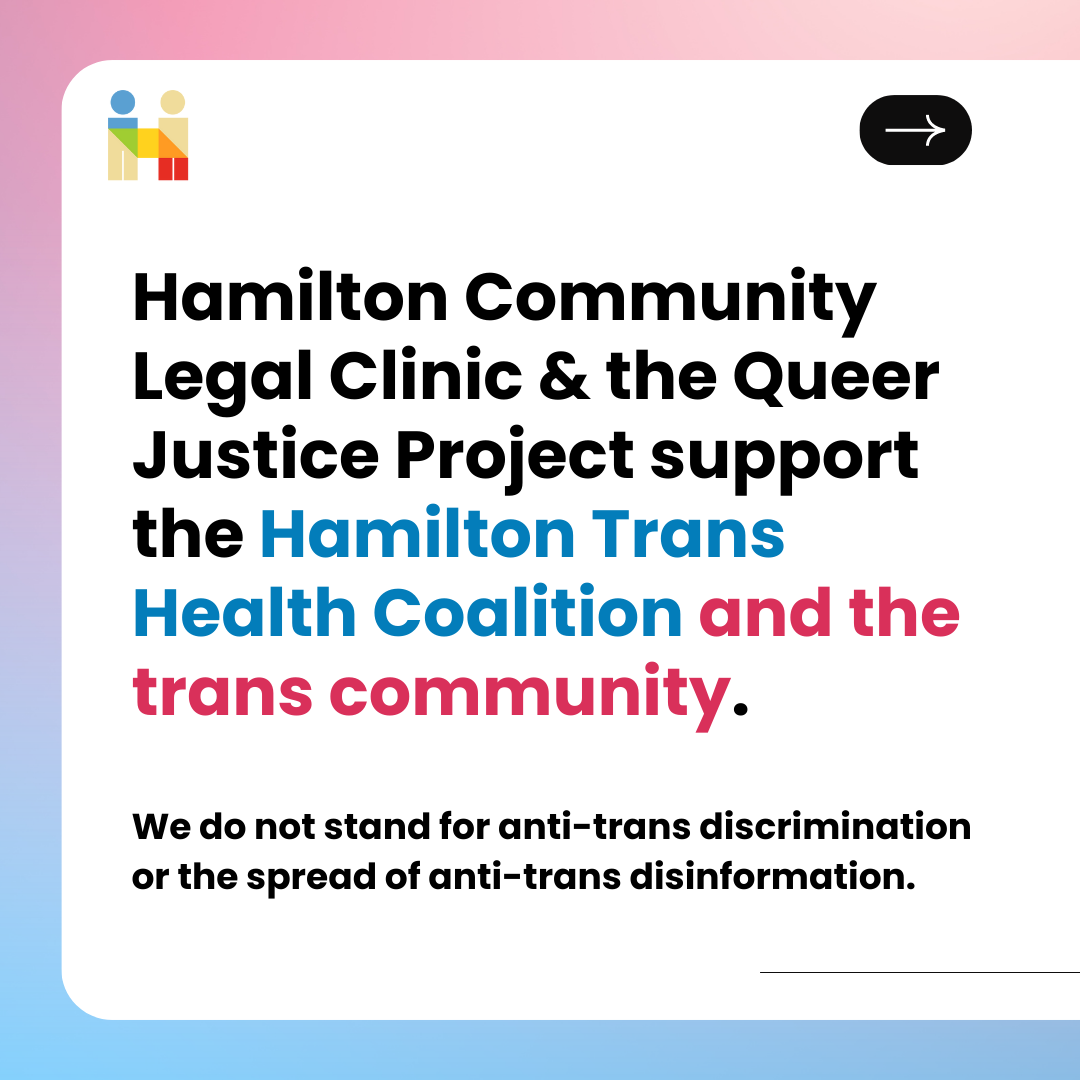
FOR IMMEDIATE RELEASE
Statement in support of Hamilton’s rejection of anti-trans disinformation
HAMILTON, ONTARIO, August 28, 2023 – We endorse the statement made by Hamilton Trans Health Coalition in response to a recent letter published in the Hamilton Spectator on July 21st. Attacks against trans and gender-diverse people are increasing in media and public discourse, abroad and at home. Everyone can and should learn to apply critical analysis to the disinformation and tactics employed in these attacks.
Trans youth are real. They know their genders and identities. Social affirmation and medical transition, when requested, are solidly evidence-based methods of ensuring their best health outcomes.
Access to evidence-based healthcare is a matter of access to justice. To learn more about our commitment to address unmet legal needs of the LGBTQIA+ and Two Spirit communities in Hamilton please visit queerjustice.ca.
Recipients of Ontario Works (OW) or Ontario Disability Support Program (ODSP) may be eligible to obtain a cooling device (such as an air conditioner) as a discretionary benefit.
As the frequency of extreme heat events occurs, the need for cooling devices increases. Those without access to cool spaces during extreme heat events can be subjected to prolonged exposure. Such exposure can cause loss of internal temperature regulation which can lead to various negative health effects or, in some cases, death.
The impacts of extreme heat events disproportionately effect certain vulnerable populations, such as the elderly, low-income earners, and individuals with existing health vulnerabilities.
Learn more, including eligibility requirements and restrictions, in OW and ODSP Discretionary Benefits and Cooling Devices (PDF). This is a resource developed by the Canadian Environmental Law Association.
On November 24th, 2022, a hate rally was organized in response to a family-friendly Drag Storytime event being held at the Terryberry library. Unfortunately, in response to the organization of this event, a small group of bigots gathered in an attempt to disrupt and protest. The words and actions of this group were in line with the rising tide of violence and hate that Queer communities across Canada are facing. Their allegations against the organizers, talent, and Queer community more broadly, have no basis in reality, and are irresponsible, ignorant, and dangerous. The Queer Justice Project and the Hamilton Community Legal Clinic condemn this hateful demonstration.
Such events are displays of ignorant bigotry that are putting our Queer communities in danger. It must not rest solely on Queer communities to bear witness, defend against, and call out this pattern of hate and violence. For our community at large, who might be just engaging with issues impacting the Queer community, we encourage you to take advantage of numerous educational and informational tools that can accessed online, including through the Hamilton Public Library. Queerness challenges and calls on all of us to reconsider beliefs and realities about more than just gender and sexuality but about how we love and live alongside each other in ways that respect and celebrate differences. All members of our community should rise to that challenge out of a shared spirit of love and acceptance – and not hatred and violence.
View the full statement on anti-2SLGBTQ+ action at Terryberry library